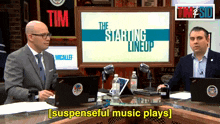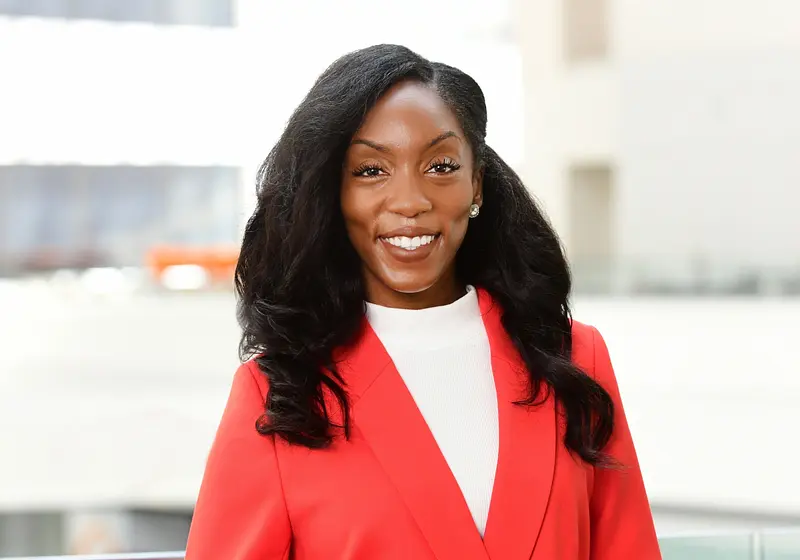When we scroll through social media, one of the last things that come to mind when we encounter news is, "This must be fake."
Yet, we are exposed to it all the time. From over-exaggerated stories to outright false allegations, our generation has dealt with our fair share of "fake news." Social media has its benefits and drawbacks, and this phenomenon is one of the drawbacks of social media. The platform provides a space where anyone, if clever enough, can spread lies without consequence.
It's high time to end this problem, and that's where the News Literacy Project comes into play.
The News Literacy Project is a nonpartisan educational nonprofit aimed at fostering a nationwide movement promoting news literacy across American society. Its mission is to cultivate well-informed, actively engaged, and empowered individuals, leading to a more robust democracy in the long run.
In this TTM X the News Literacy Project collab, we had the privilege of sitting with Ebonee Otoo, the Senior Vice President of Educator Engagement. She provided invaluable insights on media literacy and offered guidance on navigating social media platforms like TikTok to find trustworthy information.
Let us slide into your dms 🥰
Get notified of top trending articles like this one every week! (we won't spam you)The News Literacy's Birth
"What do your parents do?"
The signature question that most children and even adults ask each other at the most random times. From construction workers and investment bankers to business owners and even millionaires, we often hear about people's different jobs. The News Literacy Project was born in 2008 from this simple question.
Alan C. Miller, a Pulitzer Prize-winning journalist, visited his daughter's middle school classroom to discuss what he did as a journalist and why it mattered. He saw the value of journalists sharing their experience and expertise in America's classrooms. He helped launch the field of news literacy. An average "take your parent to school" event spiraled into 15 years of dedication, hard work, and remarkable achievements.
Take the Quiz: Which Indian city is the perfect holiday spot for you!?
Let's match you with an Indian city that you would love!
Empowering Minds
"Misinformation is a problem that affects everyone – so we need everyone to also be a part of the solution! That's why we strive for inclusivity and accessibility in so many ways here at NLP." - Ebonee Otoo
The News Literacy Project doesn't just talk the talk; they walk the walk by offering impactful programs for various people. Best of all, everything they provide is entirely free, and they go the extra mile to ensure accessibility and inclusivity. Their virtual lessons offer captions and the option to slow down videos, making learning more accessible for everyone.
They even ensure that their social media images have alt-text so nobody misses out on crucial information. How thoughtfully they curate their hosts, panelists, and partners also sets them apart. They strive to represent diverse racial, geographical, and political backgrounds, ensuring their programs are accessible and beneficial to individuals from all walks of life. NLP genuinely commits to making knowledge and information available to everyone, and they have a catalog of resources to back it up:
Checkology® - NLP's virtual classroom where users watch video lessons and answer questions on news literacy topics, such as identifying bias in media coverage. The platform's effectiveness is proven through annual measurements, showcasing significant improvements in students' news literacy skills.
New lessons are regularly added to address timely issues, like "Be Health Informed," which helps users spot health-related misinformation from actual social media examples. Checkology is also free for anyone to use, and they have adapted the lessons so that they can be used by the public – not just teachers and students.
NewsLitCamps® - This program is special because it brings together journalists and educators, who often have a lot in common: Both professions tend to be public service-oriented but underappreciated, and can be challenging! The reporters aim to help teachers understand the standards and process for producing quality, credible news reports. Teachers learn important news literacy concepts they can teach in their own classrooms.
The Sift® - NLP's weekly newsletter, specifically for teachers, delivers relevant media news and recent examples of misinformation, along with prompts and tips for classroom discussions and activities. Educators love The Sift® because it provides timely, real-world examples they can use in their classrooms.
For example, Massachusetts educator Mary Robb uses it regularly in her Democracy and Media Literacy class to supplement discussion on current events. Her students also read the stories and write their thoughts about them, helping them become more mindful media consumers.
Get Smart About News®- Just because you're not an educator doesn't mean you have to miss out on any valuable tricks on how to master news literacy. The News Literacy Project has also crafted a free general newsletter to deliver this information to the public. Get Smart About News® weekly newsletter rounds up stories illustrating real-world news literacy lessons about the media, misinformation, Artificial Intelligence, and other hot topics.
The newsletter exposes readers to news from multiple, credible sources – important news literacy practices. The newsletter also often includes clips from NLP's social media platforms with simple tutorials for practicing news literacy skills, like how to perform a reverse-image search to confirm whether a weird photo you may have seen online is authentic or doctored.
Lasting Words of Wisdom
1. Tips and Tricks
"One of the most important things to remember about social media platforms is that anyone can post! It doesn't have to be true. That can make it hard to find information that's accurate, or that's primarily meant to inform you – instead of influence you to do something." - Ebonee Otoo
Social media is only as real as we make it out to be. With the rise in edited photos and staged settings, it's important to remember that not everything is what it seems. Another aspect of social media that makes it hard to find credible information is that they're constantly changing.
For example, Twitter's verification no longer means what it used to -- now, it just means that someone paid for the checkmark. Many platforms have also pulled back on efforts to moderate misleading or false information, partly because of concerns about censorship.
With social media companies going back as early as 1997, it's safe to say that social media has been a part of our lives before we were even born! Yet, with so many false news sources out there, social media companies have tried many ways to curb misinformation, but often with disappointing results. It raises the question: Is there a foolproof way to avoid fake stories? Ebonee shares, "We think the best way to stem the tide of false and misleading information is for everyone to learn how to be news literate. Online hoaxes will have a harder time gaining traction if people know how to spot them and don't share false information in the first place, and social media users will know where to go for credible information."
Although these companies may have abandoned efforts to promote honesty online, there are still ways for individuals to filter through true and false information themselves. One piece of advice is to conduct a quick search for the claim on your browser but avoid clicking only on the first link. It's crucial to consult multiple sources to avoid missing important information. Additionally, verify the sources' credibility by considering whether their coverage avoids bias and whether the outlet is committed to accuracy by promptly correcting errors.
If you do manage to come across a post that seems suspicious, the most important thing to do is to check it out before re-sharing. Ebonee notes, "It's hard to take back something that's not true once you've posted it: Research shows that misinformation travels further than fact-checks." But there are probably many of you who are wondering about the ethical concerns that come with combating an issue like this. Especially since the underlying problem of censorship pops up constantly. "An essential part of being news-literate is understanding and appreciating the First Amendment and the role of a free press in a democracy.
Censorship as a means of combating misinformation could infringe on our constitutional rights. We'd like to see every school require news literacy instruction before students graduate from high school," Ebonee said.
2. Warning Signs
An important red flag that you should be aware of when dealing with media sources is to be mindful of emotional triggers, whether positive or negative, as they can cloud rational thinking. Misinformation spreaders exploit these emotions, hoping you'll like or share their content impulsively. Watch out for signs like missing links or unsupported claims in screenshots. Always consider the source's credibility and standards before trusting information, such as the poster's identity and reliability.
Distinguishing opinion and factual information can be challenging, especially with the increasing presence of opinion commentary in the news. However, there are strategies to help you discern the difference. One approach is to question the purpose of the information.
If it aims to persuade you or expresses subjective views using terms like "perspective" or "viewpoint," it's likely an opinion. Using first-person pronouns like "I" or "you" may indicate an opinion. On the other hand, factual information primarily intends to inform. Yet, even factual information can be biased by omitting crucial details that don't support a particular viewpoint. To spot bias, consider whose viewpoint is presented and whose is ignored. Analyze the language's tone, as biased content often employs emotionally charged words. Also, examine how a story is framed, focusing on emphasized and omitted details.
"We've all seen a rumor or conspiracy theory being shared loved ones on social media. Some of the most dangerous examples I've seen are anecdotes of people being "healed" from COVID after drinking bleach. Those accounts were scary, as comments started to reflect a shared desire to repeat this course of treatment, despite warnings from the medical community that it was extremely dangerous. By doing a simple online search and knowing how to find a credible source, it would be easy to see that this was false and harmful misinformation." - Ebonee Otoo
Ultimately, we all use the internet and have our own part to play in how we use it responsibly. Ebonee advises that "social media platforms should provide and enforce clear community standards, pursue the removal of malicious accounts, and adjust algorithms to promote credible information while reducing the spread of misinformation.
Fact-checking organizations and news outlets can make sure they're on the platforms where people turn to find information, be transparent about their standards and how they pick what topics they report on, and clearly label opinion pieces. And users should make sure to follow a broad range of news and information sources that have a commitment to facts, be sure to fact-checking before sharing information, and help others become more news literate." Even if you only identify a difference in one post, you're reducing support for false news sources and contributing to the spread of accurate information.
Looking towards the future….
The News Literacy Project has been in the media literacy business for 15 years, and they don't plan to stop anytime soon. "NLP is growing all the time because we have a big mission: to build a national movement to advance news literacy throughout American society. We see this as key for creating better informed, more engaged and more empowered individuals — and ultimately a stronger democracy."
We asked Ebonee what future projects NLP has in store for the public. Ebonee shares, "We're eager to encourage more states to require media literacy instruction before students graduate high school. We're also launching new ways for the public to learn news literacy skills, offering more training opportunities and partnering with existing organizations who can help us reach more people."
Another election season is approaching, and NLP is excited to launch another campaign to help voters spot and resist misinformation, find credible sources, and be well-informed when they cast their ballots. This is especially important for first-time voters, who need to know where to go for factual information about when, where, and how to cast their ballots. NLP is also looking forward to National News Literacy Week, their annual information campaign in January, to help spread the word about the need for media literacy and how everyone can be a part of the news literacy solution instead of the misinformation problem.
Given the scale of this project, it's inevitable that more people will soon join in promoting news literacy. Ebonee contemplates, "Our vision is to build a future where news literacy is an integral part of American life. We want people of all ages and backgrounds to know how to identify credible news and other information, understand the indispensable role a free press has in a democracy, and feel empowered to play a more equal and active role in the civic life of the country."
Don't Miss it
"So many people get their news and information from social media, so it's important to us to be on those platforms, too. We want to make sure people know how to safely navigate these online spaces, so we're there to offer tips, like reminders to double-check whether something is true before sharing a post."
If you've enjoyed learning more about the News Literacy Project or want to get involved, keep up with NLP's social accounts. Check out their website for updates about these important information campaigns, and learn how you can join their efforts!














